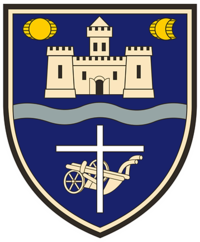National Self-Government of Germans in Hungary
National Self-Government of Germans in Hungary
Jump to navigation
Jump to search
This article needs additional citations for verification. (March 2018) (Learn how and when to remove this template message) |
National Self-Government of Germans in Hungary German: Landesselbstverwaltung der Ungarndeutschen Hungarian: Magyarországi Németek Országos Önkormányzata | |
|---|---|
 | |
| Leader | Olivia Schubert |
| Parlamentary spokesman | Imre Ritter |
| Vice President | Éva Waldmann-Baudentisztl |
| Founded | 11 March 1995 |
| Headquarters | 1026 Budapest, Júlia utca 9. |
| Youth wing | Gemeinschaft Junger Ungarndeutscher |
| Ideology | German minority interests Cultural autonomy Nationalism Conservatism |
| Political position | Centre-right |
| National Assembly | 1 / 199 |
| Website | |
| www.ldu.hu | |
| |
The National Self-Government of Germans in Hungary (German: Landesselbstverwaltung der Ungarndeutschen - LdU, Hungarian: Magyarországi Németek Országos Önkormányzata - MNOÖ) is the nationwide representative organization of the German minority in Hungary.
Contents
1 History
2 Aims
3 Electoral results
3.1 National Assembly
4 References
History[edit]
After electing minority self-governments in 1994, the electoral assembly of the German minority elected the political and cultural representative body of the Germans of Hungary, the National Self-Government of the Germans in Hungary, on 11 March 1995. According to the opportunities offered by the 2011. CLXXIX. Nationality Act, it wants to implement a modern minority policy.[1]
Aims[edit]
Its main aims are to preserve and support the language, the intellectual heritage, the historical traditions and the German identity in Hungary. That includes the preservation of the German mother tongue in cultural areas, the teaching of German language in the Hungarian school system and in the field of international relations and the exchange of German relations by partnerships and programs.[1]
The implementation of cultural autonomy, the takeover of the German institutions in Hungary, ensures the main activity of LdU.[1]
At the same time, it supports co-operation of Hungary and its neighbours, above all with German-speaking countries.[1]
It is the umbrella organization of 406 local minority self-governments and more than 500 cultural groups and other German associations of Hungary.[1]
Electoral results[edit]
Since 2014, voters of ethnic minorities in Hungary are able to vote on nationality lists. The minorities can obtain a preferential mandate if they reach the quarter of the ninety-third part (which is 14×93=1372≈0.2688%{displaystyle {frac {1}{4times 93}}={frac {1}{372}}approx 0.2688%}) of the list votes.[2] Nationalities who did not get a mandate could send a nationality spokesman to the National Assembly.[2]
In the 2014 parliamentary election, Imre Ritter was elected as the first German parliamentary spokesman in the history of the National Assembly.[3]
National Assembly[edit]
| Election | Registered voters | Votes | Preferential quota | Seats | Rank | Government | Leader of the national list | |||
|---|---|---|---|---|---|---|---|---|---|---|
| # | % | ±pp | # | +/− | ||||||
2014 | 15,209 | 11,415 | 0.23% | – | 22,022 | 0 / 199 | ±0 | 12th | extra-parliamentary | Ottó Heinek |
2018 | 33,261 | 26,477 | 0.46% | 23,829 | 1 / 199 | ±1 | 9th | Fidesz-KDNP | Imre Ritter | |
References[edit]
^ abcde "LdU - Landesselbstverwaltung der Ungarndeutschen - Zentrum Web". www.ldu.hu. Retrieved 2018-03-18..mw-parser-output cite.citation{font-style:inherit}.mw-parser-output q{quotes:"""""""'""'"}.mw-parser-output code.cs1-code{color:inherit;background:inherit;border:inherit;padding:inherit}.mw-parser-output .cs1-lock-free a{background:url("//upload.wikimedia.org/wikipedia/commons/thumb/6/65/Lock-green.svg/9px-Lock-green.svg.png")no-repeat;background-position:right .1em center}.mw-parser-output .cs1-lock-limited a,.mw-parser-output .cs1-lock-registration a{background:url("//upload.wikimedia.org/wikipedia/commons/thumb/d/d6/Lock-gray-alt-2.svg/9px-Lock-gray-alt-2.svg.png")no-repeat;background-position:right .1em center}.mw-parser-output .cs1-lock-subscription a{background:url("//upload.wikimedia.org/wikipedia/commons/thumb/a/aa/Lock-red-alt-2.svg/9px-Lock-red-alt-2.svg.png")no-repeat;background-position:right .1em center}.mw-parser-output .cs1-subscription,.mw-parser-output .cs1-registration{color:#555}.mw-parser-output .cs1-subscription span,.mw-parser-output .cs1-registration span{border-bottom:1px dotted;cursor:help}.mw-parser-output .cs1-hidden-error{display:none;font-size:100%}.mw-parser-output .cs1-visible-error{font-size:100%}.mw-parser-output .cs1-subscription,.mw-parser-output .cs1-registration,.mw-parser-output .cs1-format{font-size:95%}.mw-parser-output .cs1-kern-left,.mw-parser-output .cs1-kern-wl-left{padding-left:0.2em}.mw-parser-output .cs1-kern-right,.mw-parser-output .cs1-kern-wl-right{padding-right:0.2em}
^ ab "2018 - Nemzeti Választási Iroda". National Election Office (in Hungarian). Retrieved 2018-03-18.
^ "Megkezdte munkáját Ritter Imre német nemzetiségi szószóló" (in Hungarian). Retrieved 2018-03-23.
Categories:
- Political parties in Hungary
- German minorities
- Ethnic minorities in Hungary
- Hungarian German communities
(window.RLQ=window.RLQ||).push(function(){mw.config.set({"wgPageParseReport":{"limitreport":{"cputime":"0.444","walltime":"0.556","ppvisitednodes":{"value":1424,"limit":1000000},"ppgeneratednodes":{"value":0,"limit":1500000},"postexpandincludesize":{"value":23842,"limit":2097152},"templateargumentsize":{"value":1891,"limit":2097152},"expansiondepth":{"value":12,"limit":40},"expensivefunctioncount":{"value":4,"limit":500},"unstrip-depth":{"value":1,"limit":20},"unstrip-size":{"value":8640,"limit":5000000},"entityaccesscount":{"value":0,"limit":400},"timingprofile":["100.00% 468.285 1 -total"," 63.77% 298.637 1 Template:Infobox_political_party"," 59.10% 276.751 1 Template:Infobox"," 39.22% 183.677 1 Template:Br_separated_entries"," 33.91% 158.781 1 Template:Lang-de"," 14.58% 68.293 1 Template:Refimprove"," 14.16% 66.300 1 Template:Cite_web"," 9.33% 43.703 1 Template:Ambox"," 7.14% 33.436 23 Template:If_empty"," 4.51% 21.099 3 Template:Composition_bar"]},"scribunto":{"limitreport-timeusage":{"value":"0.272","limit":"10.000"},"limitreport-memusage":{"value":13165236,"limit":52428800}},"cachereport":{"origin":"mw1252","timestamp":"20181222081012","ttl":1900800,"transientcontent":false}}});});{"@context":"https://schema.org","@type":"Article","name":"National Self-Government of Germans in Hungary","url":"https://en.wikipedia.org/wiki/National_Self-Government_of_Germans_in_Hungary","sameAs":"http://www.wikidata.org/entity/Q1802607","mainEntity":"http://www.wikidata.org/entity/Q1802607","author":{"@type":"Organization","name":"Contributors to Wikimedia projects"},"publisher":{"@type":"Organization","name":"Wikimedia Foundation, Inc.","logo":{"@type":"ImageObject","url":"https://www.wikimedia.org/static/images/wmf-hor-googpub.png"}},"datePublished":"2018-03-17T22:57:04Z","dateModified":"2018-09-28T20:07:09Z","image":"https://upload.wikimedia.org/wikipedia/commons/b/bd/Das_Wappen_der_Ungarndeutschen.png","headline":"organization"}(window.RLQ=window.RLQ||).push(function(){mw.config.set({"wgBackendResponseTime":116,"wgHostname":"mw1245"});});
